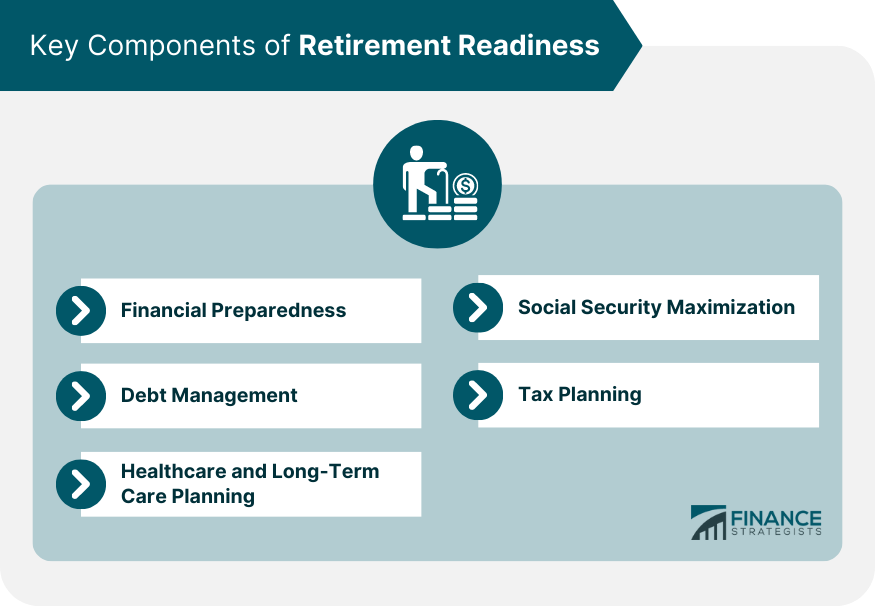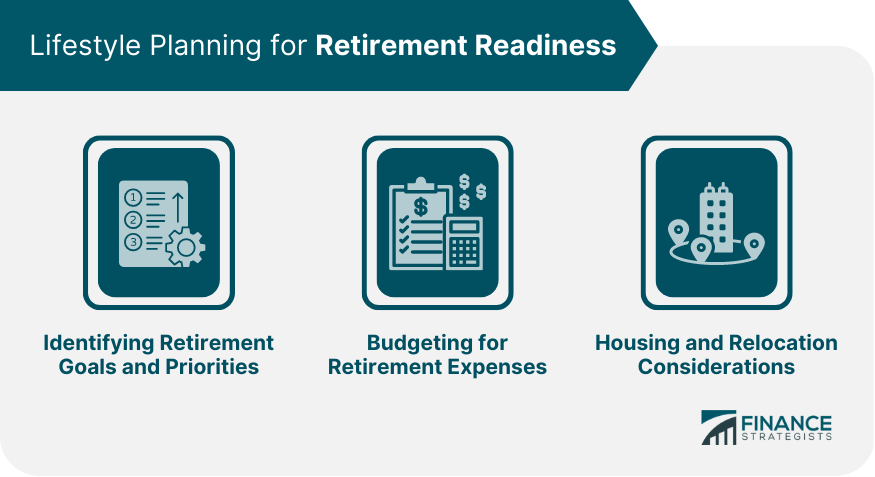Retirement readiness refers to the state of being financially, emotionally, and psychologically prepared for the transition from working life to retirement, ensuring that individuals can maintain their desired standard of living and achieve their retirement goals. Achieving readiness is crucial for ensuring a secure and fulfilling retirement, minimizing the risk of financial shortfalls, and promoting overall well-being during the later stages of life. A key component of retirement readiness is having adequate savings and investments to provide a stable income throughout retirement. This includes employer-sponsored retirement plans, individual retirement accounts (IRAs), and other investment vehicles. The income replacement ratio is the percentage of pre-retirement income that individuals need to maintain their desired standard of living in retirement. A commonly recommended target is 70-80%, though individual circumstances may vary. Having multiple sources of retirement income, such as Social Security benefits, pensions, annuities, and investment income, can help reduce the risk of financial shortfalls and provide a more stable income throughout retirement. Paying off high-interest debt, such as credit card balances and personal loans, before retirement can help reduce financial strain and free up income for other retirement expenses. Deciding whether to pay off a mortgage before retirement or continue making payments during retirement is an important consideration that depends on individual circumstances, such as interest rates, tax implications, and cash flow needs. Understanding Medicare coverage options and considering supplemental insurance policies can help ensure adequate healthcare coverage during retirement and mitigate potential healthcare costs. This type of insurance can provide financial protection against the costs of long-term care services, such as assisted living or nursing home care, which are not typically covered by Medicare or standard health insurance policies. The age at which individuals claim Social Security benefits can significantly impact the amount of their monthly benefits. Delaying the start of benefits can result in higher monthly payments, while claiming early can result in permanently reduced benefits. There are various strategies for maximizing Social Security benefits, such as coordinating spousal benefits, considering survivor benefits, and taking advantage of available claiming options. Implementing tax-efficient strategies, such as strategically withdrawing from tax-deferred and taxable accounts, can help minimize the tax burden and maximize the longevity of retirement savings. Understanding and complying with required minimum distribution (RMD) rules for tax-deferred retirement accounts can help avoid costly tax penalties and ensure a more tax-efficient retirement income. Transitioning from work to retirement involves adjusting to new daily routines, which can be challenging for some individuals. Establishing a consistent schedule and incorporating meaningful activities can help ease the adjustment process. Identifying and pursuing activities, such as hobbies, volunteer work, or part-time employment, can contribute to overall well-being and satisfaction during retirement. Retirement can provide opportunities to build new relationships and expand social networks, such as joining clubs, attending community events, or participating in group activities. Maintaining connections with former colleagues can provide a sense of continuity and support during the transition to retirement, as well as opportunities for socializing and networking. Pursuing hobbies and interests during retirement can help maintain mental sharpness, promote overall well-being, and provide opportunities for personal growth and development. Staying physically active and prioritizing health and wellness during retirement can contribute to a higher quality of life, reduce the risk of chronic health conditions, and support overall well-being. Setting goals and priorities for travel and leisure activities during retirement can help ensure that individuals have the financial resources and time to pursue their desired experiences. Participating in volunteer work or community involvement during retirement can provide a sense of purpose, contribute to personal fulfillment, and foster social connections. Distinguishing between essential and discretionary expenses during retirement can help individuals develop a realistic budget and prioritize their spending to align with their retirement goals and priorities. Reducing discretionary expenses or finding cost-saving opportunities can help retirees live within their means and maintain their desired standard of living. Deciding whether to downsize to a smaller home or age in place can have significant financial and lifestyle implications. Factors to consider include maintenance costs, accessibility, and proximity to family and friends. Evaluating retirement communities and other housing options can help individuals find a living arrangement that best suits their needs, preferences, and budget during retirement. Reviewing retirement savings projections and comparing them to estimated future expenses can help individuals assess their financial readiness and identify any potential shortfalls or areas for improvement. Conducting stress tests on retirement savings projections, such as adjusting for changes in investment returns, inflation, or life expectancy, can help individuals evaluate their financial resilience and preparedness for various scenarios. Seeking professional financial planning and investment advice can help individuals develop and implement a comprehensive retirement plan that addresses their unique needs, goals, and circumstances. Engaging the services of tax and estate planning professionals can help individuals develop strategies to minimize taxes, protect assets, and ensure a smooth transfer of wealth to heirs and beneficiaries. Taking a holistic approach to retirement readiness is essential for ensuring a secure and fulfilling retirement experience. By addressing financial, emotional, psychological, and lifestyle factors, individuals can create a comprehensive plan that aligns with their goals and aspirations. Regularly assessing and adjusting retirement plans in response to changing circumstances, goals, and priorities is crucial for staying on track and maintaining retirement readiness. By focusing on the various aspects of retirement readiness and making informed decisions, individuals can enhance their chances of achieving a secure and fulfilling retirement. Seeking professional guidance in financial planning, investment advice, tax, and estate planning can further help individuals develop strategies to minimize taxes, protect assets, and ensure a smooth transfer of wealth to heirs and beneficiaries. This comprehensive approach will ultimately contribute to overall well-being and satisfaction during the later stages of life.What Is Retirement Readiness?
Key Components of Retirement Readiness
Financial Preparedness
Savings and Investments
Income Replacement Ratio
Diversification of Income Sources
Debt Management
Paying Off High-Interest Debt
Mortgage Considerations
Healthcare and Long-Term Care Planning
Medicare and Supplemental Insurance
Long-Term Care Insurance
Social Security Maximization
Timing of Benefit Claims
Strategies for Maximizing Benefits
Tax Planning
Tax-Efficient Withdrawal Strategies
Required Minimum Distributions

Psychological and Emotional Readiness
Transitioning From Work to Retirement
Adjusting to New Routines
Finding Purpose and Fulfillment
Maintaining Social Connections
Building New Relationships
Staying Connected With Former Colleagues
Staying Mentally and Physically Active
Engaging in Hobbies and Interests
Prioritizing Health and Wellness
Lifestyle Planning for Retirement Readiness
Identifying Retirement Goals and Priorities
Travel and Leisure Activities
Volunteer and Community Involvement
Budgeting for Retirement Expenses
Essential vs Discretionary Expenses
Adjusting Spending Habits
Housing and Relocation Considerations
Downsizing or Aging in Place
Evaluating Retirement Communities

Evaluating Retirement Readiness
Assessing Financial Health
Retirement Savings Projections
Stress Testing Various Scenarios
Seeking Professional Guidance
Financial Planning and Investment Advice
Tax and Estate Planning Services
Conclusion
Retirement Readiness FAQs
Retirement readiness is a measure of an individual's financial preparedness for retirement. It considers retirement savings, anticipated retirement expenses, and the ability to generate sufficient retirement income.
There are many tools and calculators available to help individuals assess their retirement readiness. These typically involve inputting information such as current age, retirement age, retirement savings, anticipated retirement expenses, and expected retirement income sources.
To improve retirement readiness, individuals can take steps such as increasing savings, reducing expenses, and considering ways to generate additional income, such as through part-time work or rental income. It can also be helpful to work with a financial advisor or retirement planner to develop a comprehensive plan.
Retirement readiness is important because it can impact an individual's financial security and quality of life in retirement. Individuals who are not adequately prepared for retirement may struggle to meet their expenses or have to rely on social safety nets, such as Social Security or Medicare.
Employers can help improve retirement readiness among their employees by offering savings plans, such as 401(k)s or 403(b)s, and providing education and resources on retirement planning and savings. Employers can also consider offering retirement plan incentives, such as matching contributions or profit-sharing, to encourage employees to save more for retirement.
True Tamplin is a published author, public speaker, CEO of UpDigital, and founder of Finance Strategists.
True is a Certified Educator in Personal Finance (CEPF®), author of The Handy Financial Ratios Guide, a member of the Society for Advancing Business Editing and Writing, contributes to his financial education site, Finance Strategists, and has spoken to various financial communities such as the CFA Institute, as well as university students like his Alma mater, Biola University, where he received a bachelor of science in business and data analytics.
To learn more about True, visit his personal website or view his author profiles on Amazon, Nasdaq and Forbes.











